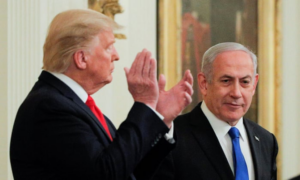The Road to Annexation is Growing Narrower by the Minute
President’s Trump’s peace plan, which includes the controversial measure of annexing parts of Area C in the West Bank and settlements under Israel rule, is progressively drifting further and further away from its initial specifications. Its implementation is currently surrounded by an abundance of question marks and serious doubts. The closer we draw to its target date (July 2020), the greater the number of obstacles standing in the way of the ambitious plan: we are yet to see a final map, a green light from the American administration or an agreement between the Israeli coalition partners – Likud and Kahol Lavan.
However, the map and the date are not the core of the problem. Their absence is mainly a symptom of the fact that there is still currently no action plan to speak of. The question right now is not whether annexation will take place and when, but what annexation even means to each side in the equation and whether it is at all feasible. In the fickle reality of the Middle East, where change is frequent and often sudden, and where a large number of actors are constantly tugging in different directions, every day seems to give rise to new challenges. Therefore, it appears that even if annexation does go forward, it will certainly take a far more modest form than previously declared.

Image: Donald Trump and Benjamin Netanyahu at the White House in January 2020. (Source: Brendan McDermid/Reuters)
Lack of domestic consensus
The first factor standing in the way of the measure stems from its very initiators. It looks like the Covid-19 crisis, the Trump government’s lack of stability and public trust, as well as the United States’ desire to maintain ties with their allies in the Middle East, have incited the U.S. to recalibrate their initial strategy. Since realizing that Benjamin Netanyahu would not be able to establish a coalition government without his rival Benny Gantz, the U.S. has been consistently qualifying its recognition of Israel’s right to annex West Bank settlements.
American officials have repeatedly stated, since before the public announcement of the peace plan, that they cannot support such an internationally controversial measure without, at the very least, widespread support within Israel’s own government. As political and economic instability in the U.S. grew more dire, so grew the Americans’ insistence on receiving full coalitional agreement from Israel.
On the eve of the election, Gantz declared that he would support extending Israeli sovereignty to the Jordan Valley, “in coordination with the international community.” Accordingly, Kahol Lavan’s willingness to discuss annexation is conditioned upon certain restrictions. For example, a declaration of partial sovereignty has to be accompanied by some measures of reciprocity towards the Palestinians. Likewise, the Palestinians themselves cannot be annexed. That is to say, Israeli rule can only be applied to territories that are either inhabited by Israelis or uninhabited. Such conditions stipulated by Kahol Lavan make any possibility of a compromise with Netanyahu almost unimaginable. And yet it is precisely such a compromise that the U.S. is currently demanding as a requisite condition for American support.

Image: Prime Minister Benjamin Netanyahu points at a map of the Jordan Valley, promising to extend Israeli sovereignty to the Jordan Valley (Source: Menahem Kahana/AFP)
It is paramount to understand this point and the extent to which it backs Netanyahu into a corner. Over the last few years, Netanyahu has positioned himself and the Likud party not only as representatives of the liberal right in Israel, but as champions of the West Bank settlers. The secret behind the Likud’s ability to sweep almost a third of the seats in the Israeli parliament has been their ability to motivate the nationalist-religious public to cast their ballots for them, rather than for other parties traditionally identified with this group. The problem is that we are already hearing sounds of staunch opposition to the plan from local council leaders in West Bank settlements.
Should Netanyahu accept Kahol Lavan’s demands for talks with the Palestinians, or even actually work towards the establishment of an official Palestinian state, he will run up against dire opposition from his own camp. The latter will not only actively strive to obstruct his actions; they will express their anger during the next election, which may come sooner rather than later, since Israeli elections tend to take place every two and a half years or so on average. As a man who stands accused of criminal misdoings, and who is presently standing trial in the Supreme Court, Netanyahu will do anything he can to hold on to the power afforded to him by the position of Prime Minister. His future is thus hanging by a thread, whether he succeeds in implementing the peace plan or not.
The Arab coalition against the annexation
This complexity on the Israeli-American axis of negotiations is juxtaposed with some very lively activity on the part of the Palestinians, who are vehemently opposed to unilateral annexation, as well as any arrangement that would leave the holy sites in Jerusalem under permanent Israeli control. Recently, the Palestinians submitted a counter-offer to Trump’s peace plan to the UN’s Security Council Quartet. Their proposal includes the establishment of a demilitarized Palestinian state with slight changes to borders that have already been discussed previously, specifically in 2008 as part of the talks between Palestinian Authority President Mahmoud Abbas and then-Israeli Prime Minister Ehud Olmert.
The chances that this proposal should be approved are very low, but it does make sure that the issue remains on the international community’s agenda and registers the Palestinians’ objection through resonant diplomatic channels. The Palestinians’ efforts are backed up by a clear, poignant, and rather rare statement issued by the Jordanian royal family. The message sent to the Israelis and the Americans is unequivocal: the implementation of a peace plan, and especially of any unilateral steps towards annexation without negotiations, will not lead to the dawn of a new Middle East, but, on the contrary, will set the area back by many years and force Jordan to revoke its existing treaties with Israel.
This is an important point that must not be taken lightly. The State of Israel has spent a large portion of its existence facing severe existential threats. Its peace treaties with Egypt and Jordan may not have established any particularly warm relationships, but they did put an end to unending border disputes which claimed significant resources and lives. If Jordan were to back out of its existing agreements with Israel, it would open the door to an unanticipated deterioration in the region.
One last remark: the intricate triangle of diplomatic relationships between Israel, the United States and the Arab world presents enormous difficulties for the plan’s implementation, beyond those presented by the opposition of the Palestinians and certain West Bank settlers. In early June, the United Arab Emirates’ Ambassador to the US, Yousef Al Otaiba, addressed the Israeli public in an article published in one of Israel’s most widely circulated newspapers (Yedioth Ahronoth). In it, he warned Israelis that annexation would destroy any chance of improving and normalizing relations between Israel and the Arab world, in particular the UAE.

Image: Emirati Ambassador to the US Yousef al-Otaiba (Source: AP Photo/Jon Gambrell)
By doing so, he made it clear that the ramifications of annexation would spread far beyond the confines of the Israeli-Palestinian conflict. Al Otaiba’s warning is directed not only at the Israeli audience, but also at the American government. As diplomatic and economic relations between the U.S. and the moderate Arab states flourish, the wealthy UAE has seen fit to send a signal that these relations are not enough to erase the Palestinian problem from their agendas. Following the ambassador’s appeal, Jared Kushner, Trump’s son-in-law, has also swerved towards a more moderate attitude, demanding that annexation either be postponed or reduced substantially in scope.
Having said all of this, let us conclude by stating that the many actors and interests involved, as well as the unusual events that continue to unfold in the world and in the Middle East, will most likely lead to a postponement of the annexation plan. We have not even mentioned the staunch opposition of the international community – and of the European Union in particular – to the plan, the complications brought on by the Covid-19 pandemic, as well as the possibility of protest riots breaking out on the Palestinian side should diplomacy break down. Any false move at the present moment is liable to reignite the fuse and lead to further bloodshed. Therefore, even if Trump’s peace plan does come to pass, it is reasonable to assume that its implementation will take place much further down the line and its shape will differ significantly from the initially announced outline. When all is said and done, the chances that any such fateful turn of events should come about in July 2020 are fairly slim.
Author: Renen Yezersky






